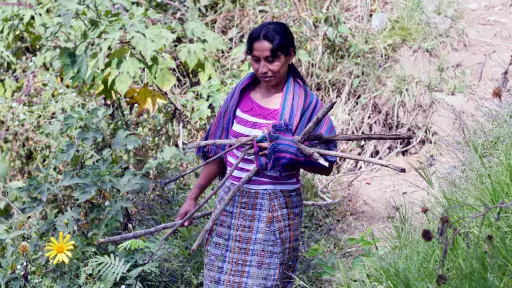Indigenous Calendar August, 2018: Information Access

At this time in history more people have more instant access to more information than ever before. In relative terms, but a thousand years ago, the same was true of the Maya. Yet, access to all that information did not prevent their sudden and rapid decline. We will likely never know the exact causes of that decline, but environmental degradation was certainly one of them. Out of the ashes of the declining Maya Empire rose a number of post-classic Maya peoples including the ancestors of this woman — the Kaqchikel people.
Today we are able to predict more accurately from our information than the Maya were. It is hard to imagine that Maya societies included environmental activists. Our environmental activists could be said to be the soothsayers of the modern age. Many of them are indigenous people. It is likely that some among the educated Maya saw the signs of decline. It is also likely that Maya rulers considered warmongering and the continued accumulation of wealth to be their highest priority.
Last month Global Witness released its 2017 annual report on environmental activism: a record number of activists (207) were murdered. Most of the killing took place at the hands of those considering the continued accumulation of wealth to be their highest priority. As with the Maya before them, modern rulers are facilitating the prioritization of wealth: Brazil, one of the worst offenders, is making it harder to defend the environment. It had the most killings (57) in 2017. Combined with the Philippines (48), the two countries accounted for more than half of all the murders.
It may seem to us that a woman collecting firewood is hardly a sign of progress based on thousands of years of the accumulation of knowledge. But it is precisely that Indigenous Knowledge (IK) that enabled the Kaqchikel to avoid the mistakes of their ancestors and survive into the present day. It probably seems even less likely to us that much of the world still relies on IK. But at a time when the world's richest country cannot get healthcare right, the World Health Organization says that most people worldwide rely on IK for their healthcare needs. In Ethiopia, for example, 80% of the population uses IK in everyday life from family planning to animal husbandry.
Of all the information we have access to, IK is underrepresented. But it is unlikely we will survive without it.
The Kaqchikel Maya are featured in our documentary, Ancient and Modern Mayan Peoples.
If you enjoyed reading this article, please consider supporting independent, advertising-free journalism by buying us a coffee to help us cover the cost of hosting our web site. Please click on the link or scan the QR code. Thanks!


